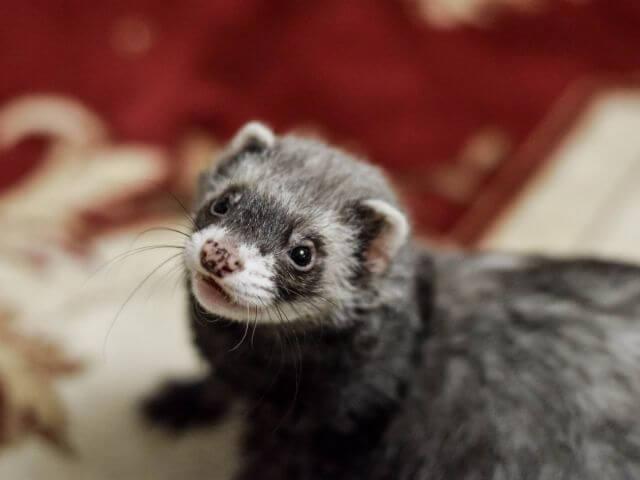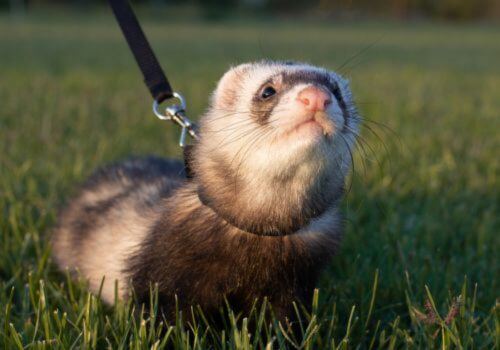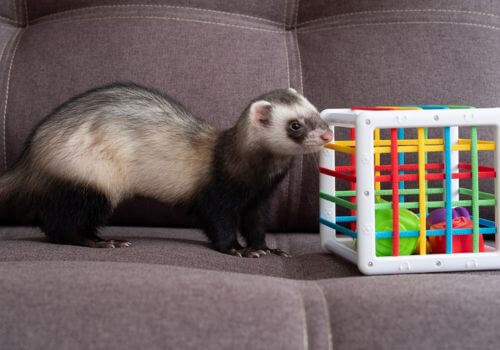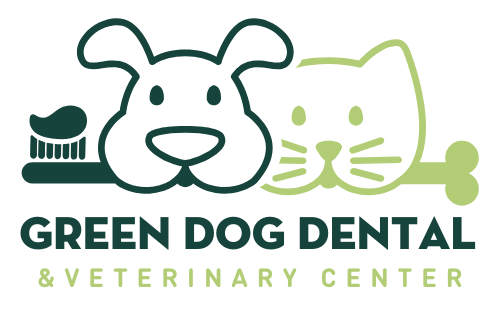
Ferret Care in Van Nuys, CA
Ferrets are curious, playful, and social pets with a mischievous streak that makes them both entertaining and endearing. Their Latin name even means “little thief,” a fitting nod to their habit of stashing away toys or household items in their favorite hiding spots. This instinct to collect and hoard comes from their natural behavior in the wild, and many owners quickly learn to check under furniture or in bedding for a ferret’s “treasure pile.”
These energetic critters have lived alongside people for centuries, and can be great companions when their needs for secure housing, a high-protein diet, daily enrichment, and routine veterinary care are met. At Green Dog Dental - Veterinary Center, we help families in Van Nuys, CA provide their ferrets with the foundation for long, healthy lives. If you’re considering a ferret or already share your home with one, call us at (310) 606-2407 to schedule a wellness visit or talk with our team about ferret care.
The Facts About Ferrets
Ferrets can make excellent pets for the right home with the appropriate space and time needed for proper care. These little explorers require supervision and consistent engagement. Many ferrets enjoy learning simple tricks, like coming when called or rolling over, which makes playtime even more rewarding. Young ferrets, or kits, are especially curious and may nip while teething or playing, but with patience and gentle handling, they usually grow into affectionate, well-adjusted pets that bond closely with their families.
Because ferrets are natural predators, they need careful supervision around other animals. Some can coexist with dogs or cats if introductions are slow and well-managed, but it depends on the individual pets. Like most exotic pets, ferrets have unique needs and do best in homes that are ready to meet the extra care and attention they require.

- Lifespan: Ferrets commonly live 5–7 years, but some live longer with excellent care.
- Sleep patterns: Ferrets are crepuscular, which means they are most active during dawn and dusk. They are known for their heavy sleeping patterns and can sleep for up to 18 hours a day. When they are awake, they are incredibly energetic and playful.
- Feeding frequency: Multiple small meals or measured free-access to a high-quality ferret diet; fresh water at all times.
- Cage setup: Multi-level, secure, and enriched with hammocks, hideouts, litter corners, and chew-safe toys. Many ferrets enjoy supervised daily play in a dedicated room.
- Handling: Support the chest and hips; keep handling low to the ground to prevent falls. Supervise interactions with children.
- Multi-pet homes: Introduce cautiously. Ferrets are predators and generally should not interact with prey species (rabbits, guinea pigs, small birds/rodents). Calm, well-managed interactions with some dogs/cats may be possible under close supervision.
- Communication: Ferrets “dook” (happy chatter), hiss (warning), and may nip during teething, play, or if overstimulated. Redirect gently and provide appropriate chew outlets.
- Odor: Ferrets have a natural musky scent from skin glands. Bathing too often can increase odor by stimulating oil production. Regular enclosure and playspace cleaning helps most. Anal gland removal (de-scenting) does not eliminate normal skin musk and is not a substitute for good husbandry.
There is a lot to know about the ferret lifestyle! It's important to build a good plan for your ferret to stay healthy, happy, and safe. Green Dog Dental - Veterinary Center can help you ensure you are giving your ferret what it needs at every age.
Husbandry and Environment for a Healthy and Happy Ferret
Ferrets are natural explorers, so their housing must balance plenty of space with absolute security. A cage or enclosure should be as large as you can manage, ideally multi-level with ramps, shelves, and hammocks for climbing and resting. Because ferrets are agile and curious, bar spacing must be tight, and latches should be secure. Many ferrets quickly learn how to open simple doors and won't hesitate to take any opportunity for an adventure.
Ferrets need daily time outside of their enclosure to explore, play, and stay mentally stimulated. These sessions should always be supervised in a fully ferret-proofed space, since their curiosity can get them into trouble quickly. These playtimes must be supervised in a fully ferret-proofed area. Creating a safe environment is one of the most critical steps in keeping them healthy and out of trouble.

- Ferret-proof play zones: Plan supervised free-roam time daily. Block off gaps under appliances, secure HVAC vents, cover cords, remove toxic houseplants/foam/rubber items, and store soft plastics (commonly chewed) out of reach.
- Litter areas: Most ferrets can be litter-trained. Use square, low-sided litter boxes in cage corners and play areas with paper-based litter (avoid clumping/clay and scented products). Clean accidents quickly and reward your ferret when they use their litter box. Positive reinforcement training works best with ferrets!
- Bedding & sleep: Offer fleece hammocks, sleep sacks, and nest boxes. Ferrets sleep 12–16+ hours/day; provide quiet, dim areas for quality rest.
- Temperature & ventilation: Keep indoors in a draft-free space; ferrets overheat easily. Aim for comfortable room temperatures and good airflow, and be sure to never leave a ferret in hot or poorly ventilated areas.
- Legal notes: Check local regulations. Ferret ownership is restricted in some regions; our team can help you find up-to-date guidance.
Pro Tip: A bored ferret can be a troublemaker. If possible, consider adopting ferrets in pairs to prevent loneliness. Rotate toys regularly to keep their environment stimulating.
What Should I Feed My Ferret?
As obligate carnivores, ferrets have unique nutritional needs. Their short digestive tracts and rapid metabolism require a diet high in animal protein and fat, with little to no fiber or carbohydrates. Always talk with your veterinarian about your ferret's diet. A balanced diet keeps your ferret energetic, supports healthy muscle and coat condition, and helps prevent digestive upset. Commercial ferret diets are the easiest way to meet these needs, though some owners may also consider carefully managed raw options. Because ferrets eat often, fresh food and water must always be available.
- Core diet: Use a high-quality, ferret-formulated diet that lists animal proteins/fats as primary ingredients. Some veterinary-formulated kitten diets may be used short term, but ferret-specific nutrition is preferred.
- Feeding routine: Offer frequent, small meals or allow access to measured portions throughout the day. Fresh, clean water should be available at all times (heavy crocks help reduce spills; check sipper bottles daily for clogs).
- Treats: Small amounts of meat-based treats are acceptable. Avoid sugary snacks, fruits, starchy foods, dairy, and high-fiber items—these can upset the GI tract.
- Raw diets/bones: If you’re considering raw meat or raw meaty bones, discuss food safety and tooth/obstruction risks with our team first. Use only human-grade products and proper handling to reduce foodborne illness risk.
If you are unsure which diet suits your ferret’s age or health, our veterinarians at Green Dog Dental - Veterinary Center will work with you to create a diet tailored to your unique pet. Call (310) 606-2407 to schedule an exam. We would love to talk with you!
Veterinary Care & Wellness
Regular veterinary care is essential for ferrets. Because they can mask illness until it’s they are in more advanced stages, routine exams are critical for early detection, especially for common health issues such as adrenal disease, insulinoma, and dental problems. We recommend annual wellness visits for young, healthy ferrets and every six months for seniors or those with medical concerns. Exams also keep vaccinations on track. A baseline appointment after adoption helps us establish your ferret’s health and provides a reference for the future.
- Vaccinations: Ferrets are vulnerable to canine distemper virus and are typically vaccinated as kits with boosters, then annually. In many regions, rabies vaccination is also advised. During exams, we will always tell you what’s recommended in CA.
- Parasite prevention: Ferrets can get ear mites, fleas, and heartworm. Use only ferret-safe products and follow a prevention schedule tailored to your home and travel exposure.
- Dental & weight checks: Ferrets are prone to dental problems, so dental care is important to add to their routine. Offer chew toys that help reduce tartar buildup, and consult your veterinarian about regular dental check-ups.
- Reproductive health: Discuss spay/neuter and non-surgical options (hormone implants) with a ferret-savvy veterinarian. Jills can develop life-threatening complications with prolonged heat; thoughtful reproductive control is essential.
Common Health Concerns for Ferrets
If you notice your ferret doing any of the following, please schedule an exam as soon as possible:
- Lethargy, decreased playfulness, or hiding
- Poor appetite, drooling, pawing at the mouth, or weight loss
- Vomiting, diarrhea, melena (black stools), or straining
- Coughing, labored breathing, or frequent sneezing with discharge
- Hair loss, itchiness, or skin lesions
- Difficulty urinating/defecating, or changes in litter habits
- Shaking/trembling that doesn’t resolve with warmth or food
Emergencies (sudden collapse, severe breathing issues, suspected foreign body/obstruction) require immediate veterinary attention. Call (310) 606-2407 right away.
Activity and Enrichment
Ferrets are playful athletes who thrive on daily exercise and problem-solving. Ferrets are known for their love of "ferret-proofing" - a game where they test the limits of their environment, often leading to hide-and-seek sessions with their favorite humans. As we've said before, it's essential to set up a safe, ferret-proofed area where they can satisfy their curiosity without risk. Providing a variety of toys that encourage problem-solving and physical activity, such as tubes, boxes, and safe household items, can make their adventures and exploring more exciting.
- Play circuits: Tunnels, ramps, boxes, paper bags, and dig boxes (paper shreds or fleece strips) satisfy natural burrowing and exploring drives.
- Chew-safe items: Choose sturdy toys designed for ferrets; avoid foam, sponges, thin rubber, or soft plastics that can be chewed and swallowed.
- Training: Many ferrets learn their names, simple cues, and harness/leash walking with positive reinforcement. Short, fun sessions work best.
- Routine: Predictable play times reduce stress and channel energy into healthy behaviors.
Ferret Care at Green Dog Dental - Veterinary Center
At Green Dog Dental - Veterinary Center, we love these energetic, clever companions and understand their needs. Our team provides ferret-specific care: wellness exams, vaccination planning, parasite prevention, nutrition counseling for obligate carnivores, dental and weight management, guidance on reproductive health, and urgent care when something isn’t right.
If you live in or near Van Nuys, CA, and are looking for pet care, contact us at (310) 606-2407 to set an appointment. You can also email us at [email protected]. Our staff would love to talk with you!
Don't forget to follow us on social media: Facebook, Instagram.
